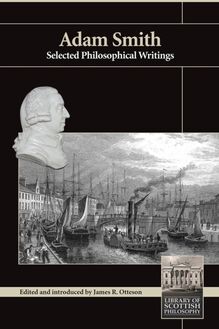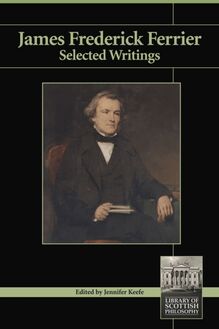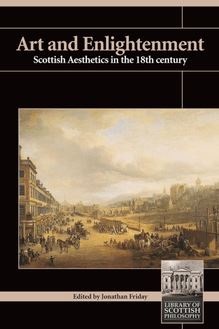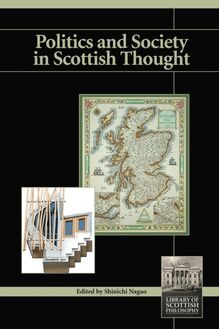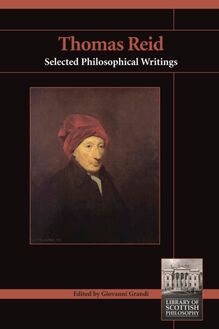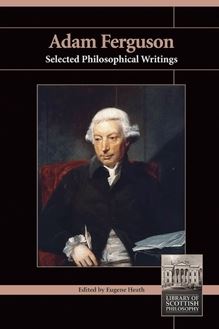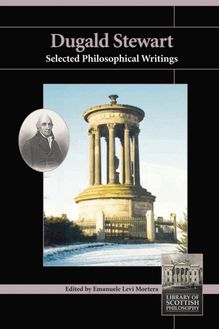John Macmurray , livre ebook
107
pages
English
Ebooks
2012
Vous pourrez modifier la taille du texte de cet ouvrage
Obtenez un accès à la bibliothèque pour le consulter en ligne En savoir plus
Découvre YouScribe en t'inscrivant gratuitement
Découvre YouScribe en t'inscrivant gratuitement
107
pages
English
Ebooks
2012
Vous pourrez modifier la taille du texte de cet ouvrage
Obtenez un accès à la bibliothèque pour le consulter en ligne En savoir plus
Publié par
Date de parution
15 mars 2012
Nombre de lectures
3
EAN13
9781845403782
Langue
English
Publié par
Date de parution
15 mars 2012
Nombre de lectures
3
EAN13
9781845403782
Langue
English
Title Page
JOHN MACMURRAY
Selected Philosophical Writings
Edited and Introduced
by Esther McIntosh
Copyright Page
Copyright © Esther McIntosh, 2004
The moral rights of the author have been asserted.
No part of any contribution may be reproduced in any form without permission, except for the quotation of brief passages in criticism and discussion.
Originally published in the UK by Imprint Academic
PO Box 200, Exeter EX5 5YX, UK
Originally published in the USA by Imprint Academic
Philosophy Documentation Center
PO Box 7147, Charlottesville, VA 22906-7147, USA
Digital version converted and published in 2012 by
Andrews UK Limited
www.andrewsuk.com
Series Editor’s Note
The principal purpose of volumes in this series is not to provide scholars with accurate editions, but to make the writings of Scottish philosophers accessible to a new generation of modern readers. In accordance with this purpose, certain changes have been made to the original texts:
Spelling and punctuation have been modernized. In some cases, the selected passages have been given new titles. Some original footnotes and references have not been included. Some extracts have been shortened from their original length. Quotations from Greek have been transliterated, and passages in foreign languages translated, or omitted altogether.
Care has been taken to ensure that in no instance do these amendments truncate the argument or alter the meaning intended by the original author. For readers who want to consult the original texts, full bibliographical details are provided for each extract.
The Library of Scottish Philosophy was launched at the Third International Reid Symposium on Scottish Philosophy in July 2004 with an initial six volumes. Attractively produced and competitively priced, these appeared just fifteen months after the original suggestion of such a series. This remarkable achievement owes a great deal to the work and commitment of the editors of the individual volumes, but it was only possible because of the energy and enthusiasm of the publisher, Keith Sutherland and the outstanding work of Jon M.H. Cameron, Editorial and Administrative Assistant to the Centre for the Study of Scottish Philosophy.
Acknowledgements
Grateful acknowledgement is made to the Carnegie Trust for the Universities of Scotland for generous financial support for the Library of Scottish Philosophy in general, and to Mr George Stevenson for a subvention for this volume in particular.
Acknowledgement is also made to the University of Aberdeen Special Libraries and Collections for permission to reproduce the engraving of the Edinburgh Faculty of Advocates from Modern Athens (1829) and to the John Macmurray Trust for permission to reprint the extracts and the cover photograph.
Gordon Graham
Aberdeen, June 2004
Introduction
A Brief Biography
John Macmurray was born on 16 February 1891 in Maxwelltown, Kirkcudbrightshire, Scotland. Macmurray’s parents were devout Calvinists and sought to raise Macmurray and his siblings according to strict religious ideals, which influenced him greatly. When Macmurray was eight years old, the family moved to Aberdeen and it was here that he first met Elizabeth (Betty) Hyde Campbell (the sister of a school friend), who later became his wife. Macmurray was educated firstly at the Aberdeen Grammar School and subsequently, having gained a scholarship, at Robert Gordon’s College. In 1909 he registered for an MA degree in Classics and Geology at the University of Glasgow. At this time he fully intended to follow his father’s wishes by becoming a missionary; hence, he joined the Student Volunteer Missionary Movement. He became a member of the Student Christian Movement as well, and it was here that he happened upon a more flexible form of Christianity than he had known previously. In his final year at Glasgow University, Macmurray was turned down by the China Inland Mission, on the grounds of ill-health. By this time, however, he had become increasingly disillusioned with dogmatic Christianity, having discovered that many traditional Christian doctrines cannot be found in the Bible.
In 1913 Macmurray graduated from Glasgow University with First Class Honours. He was keen to study philosophy and took up the place of Snell Exhibitioner and Newlands Scholar at Balliol College, Oxford. Here Macmurray began studying Greats under the tutelage of A.D. Lindsay, but war broke out before he had completed the course. Out of consideration for pacifist principles, Macmurray enlisted as a nursing orderly. By 1915 he was at the front with the Royal Army Medical Corps, where wounded soldiers received treatment on the basis of their ability to go back into combat. Hence, under the impression that he was already contributing to the fighting effort, Macmurray became a Lieutenant with the Queen’s Own Cameron Highlanders. He was granted three days leave in the autumn of 1916 to marry Betty, but had to return to the Battle of the Somme. He was not there long before being sent back to England with a broken ankle. While he was recovering, he gave a sermon in North London, urging reconciliation rather than vengeance. In response to the hostile reception his message prompted, he made the decision to reject membership of any Christian Church.
When Macmurray returned to the frontline he was sent to the Battle of Arras, where he was severely wounded and the rest of his company were killed. He was invalided home and awarded the Military Cross for bravery. When the war was over, he returned to Balliol College, Oxford to sit his examinations in Greats and to begin his career as a professional philosopher. He remained at Balliol as John Locke Scholar of Mental Philosophy for less than a year, having acquired a Lectureship in Philosophy at the University of Manchester (1919-21). Two years later he had taken up a post as Professor of Philosophy at the University of Witwatersrand, Johannesburg (1921-2), where he used his free time to campaign for improved housing for black South Africans. Before long he was invited back to Balliol College as Fellow and Classical Tutor (1922-8). In 1923 Macmurray gave the Jowett Lectures, with the title ‘The Historical Approach to Modern Idealism’, and in 1924 he was elected to the membership of the Aristotelian Society. From the articles and lectures that Macmurray gave during his time at Oxford, it is apparent that he had already begun work on the issues that were to dominate his philosophical career; in particular, he began to focus on a germinal form of his concern with the concept of the person.
Macmurray left Oxford to take up the post of Grote Professor of Mind and Logic at University College, London (1928-44), where his inaugural address was entitled ‘The Unity of Modern Problems’. Once in post Macmurray quickly reorganized the department: he decided to encourage the students to participate in seminar discussion; he established intercollegiate teaching of philosophy with the other London colleges; and he was instrumental in recruiting A.R.C. Duncan as a colleague. In addition, the Academic Assistance Council asked Macmurray to referee the work of refugee scholars fleeing Germany; hence, he was introduced to Theodor Adorno, and subsequently engaged with Karl Popper, Gabriel Marcel and Martin Buber. Moreover, Macmurray was receiving invitations from North American and Canadian universities, which led to a three month tour in 1936 that included giving the Terry Lectures in Yale (published as The Structure of Religious Experience ) and the Deems Lectures in New York (revised and published as The Boundaries of Science ). During the 1930s Macmurray also broadcast two series of lectures on BBC Radio, under the titles ‘The Modern Dilemma’ and ‘Reality and Freedom’ (collected and published as Freedom in the Modern World ). It was around this time that Macmurray began to focus on publishing monographs. He had published a number of articles before this, but he had made a conscious decision not to write a book until he was forty years old, thereby giving his thoughts time to mature. The developing theme of personhood and the relations of persons permeate all of Macmurray’s books and, within this, remnants of his early religious influences as well as his experiences of war come to the fore, primarily through the recurring themes of education, politics, fear and love.
When war broke out again, many of the staff and students from University College (UCL) relocated to Aberystwyth and Bangor, but Macmurray chose to remain in London (living in Jordans, a Quaker village in Buckinghamshire). Nevertheless, much of UCL, including Macmurray’s office, was severely bombed during the London blitz, and he was forced to join the rest of the Philosophy department in Aberystwyth. With reduced student numbers, Macmurray had more time for research; thus, in keeping with his pre-war involvement with the Christian Left, he continued to produce work on democracy and socialism. In the early 1940s he insisted on returning to London to concentrate on the possibilities for Anglo-Soviet cooperation; it was around this time that he also gave a short series of BBC Radio Broadcasts called ‘Persons and Functions’.
In 1944 Macmurray delivered the Upton Lectures on ‘The Problem of Evil’ at Manchester College, Oxford, before taking up the Chair of Moral Philosophy in Edinburgh University. While he replaced A.E. Taylor in Edinburgh, Macmurray’s vacated position in UCL was filled by A.J. Ayer. Macmurray’s inaugural address had the title ‘The Contemporary Function of M
